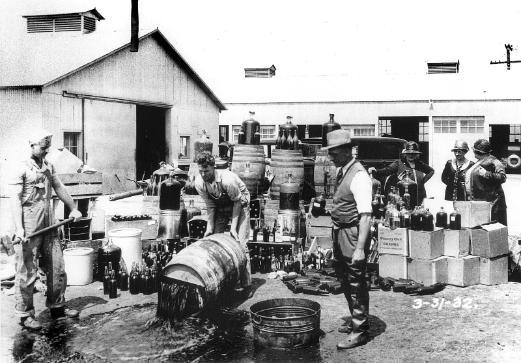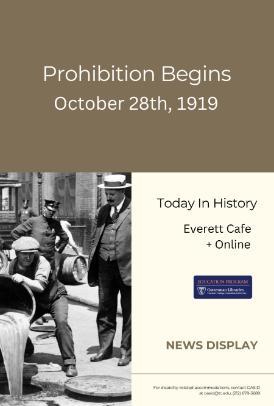Today In History: Prohibition Begins

Every Land. -- Motto of the Women's Christian Temperance Movement.
The National Prohibition Act, also known as the Volstead Act, became effective on October 28th, 1919. It was named after Andrew Volstead (1959-1947), a Minnesota-born United States Representative, Chairman of the House Judiciary Committee, and a Republican. Passed by the 66th United States Congress, it executed the Eighteenth Amendment which prohibited alcohol in the United States. Despite efforts to be "dry" or discontinue the production, sale and distribution of wine, beer, and spirits, the alcohol trade continued through networks of organized crime. Mobsters, particularly in Chicago, Detroit, and other large cities, became wealthy and enjoyed significant political power as violence escalated. In the 1920s bootlegging and speakeasies were common. Indeed, even in classic literature the theme is prevalent; F. Scott Fitzgerald's The Great Gatsby (Charles Scribner's Sons, 1925) is set in Long Island, New York during the Jazz Age and tells of the romance between the mysteriously wealthy Jay Gatsby and his former socialite lover, Daisy Buchanan.
By 1933 there was widespread opposition to prohibition for personal, social, and economic reasons. The repeal of the Volstead Act in 1933 restored the control of alcohol to the states and served to reduce crime while strengthen the national economy.
The following articles are drawn from Proquest Historical Newspapers, which informs and inspires classroom teaching and learning.
- Prohibition Law Upheld by Three Federal Judges: Hand, Knox, and Rose Declare Volstead Act Is Constitutional. (1919, Nov 15). New York Times (1857-1922)
- Constitutionality of Volstead Act: United States Judge in New York Upholds It, Denying Injunction to Brewers. (1919, Nov 15). The Christian Science Monitor (1908-)
- Volstead Act Foes to Fight for Repeal: 1,000 Men and Women Form New Organization and Pledge to Push Movement. (1925, Feb 03). New York Times (1923-)
- Dry Law Adds to Drink Evil, Survey Shows: Drunkenness on Increase Throughout U. S. Under Prohibition. (1926, Sep 27). New York Herald Tribune (1926-1962)
- "Fair Trial" of Prohibition: Replies to the Appeal for Further Patience. (1927, Jan 15) New York Herald Tribune (1926-1962)
- Burns, E. (1927, May 15). Want Your Warehouse Robbed? More Sidelines on Prohibition. Chicago Daily Tribune (1923-1963)
- Facts of Prohibition in Law and Figures: Text of Article 18, Summary of Volstead Act. (1928, Oct 28). New York Times (1923-)
- Merz, C. (1931, Oct 04). Beer as an Economic Issue: The Rival Sides Are Weighed. New York Times (1923-)
- Duffis, R.L. (1932, Jan 03). Ways Open for Wets to Defeat Prohibition: Two Methods of Changing the Amendment and the Repeal of the Volstead Act by Majority Vote. New York Times (1923-)
- The Tribune's Record on Prohibition. (1932, Jul 10). Chicago Daily Tribune (1923-1963)

Tips:
- Bertovich, Yvonne. The Story of the Eighteenth Amendment and Prohibition 100 Years Later. Ocala, FL: Atlantic Publishing Group, 2018. e-book.
- Mappen, Marc. Prohibition Gangsters : The Rise and Fall of a Bad Generation. 1st ed. New Brunswick, N.J: Rutgers University Press, 2013. e-book.
- Moore, Stephen T. (Stephen Timothy). Bootleggers and Borders : The Paradox of Prohibition on a Canada-U.S. Borderland. 1st ed. Lincoln, England ; University of Nebraska Press, 2014. e-book.
- Nonsenseorship. 1st ed. Auckland: The Floating Press, 1922. e-book.
- Prohibition : The 18th Amendment, the Volstead Act, the 21st Amendment. Washington, DC: National Archives and Records Administration, 1986. Closed Stacks Curr ; KF3919 .P76 1986
Images:
- Orange County Sheriff's Deputies Dumping Illegal Booze, Santa Ana, 3-31-1932, Courtesy of Wikimedia Commons.
- Prohibition, Courtesy of Canva.
Need to keep current, look to the past, teach a topic? The Everett Cafe features daily postings of news from around the world, and also promotes awareness of historical events from an educational context. Be sure to check additional Cafe News postings on the library blog.


